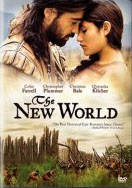
 Terrence Malick has directed very few films and written a very few more. He's well-known as an auteur and award-winner for The Thin Red Line, Days Of Heaven, and Badlands and as an uncredited writer on such hits as Dirty Harry. Malick is not exactly a workhorse director and his projects tend to come slowly and deliberately.
Terrence Malick has directed very few films and written a very few more. He's well-known as an auteur and award-winner for The Thin Red Line, Days Of Heaven, and Badlands and as an uncredited writer on such hits as Dirty Harry. Malick is not exactly a workhorse director and his projects tend to come slowly and deliberately.
It does seem strange, then, that Malick chose to make his first movie since 1998's Thin Red Line a period piece about the founding of Jamestown and the romance between the native princess Pocahontas and Captain John Smith. The tale has been told and retold in storybooks, history books, and Disney films, so many would wonder the purpose of such a movie, but Malick does what he does best: provide a dreamlike and beautiful reality to the tale, highlighting the strange primordial state of America in the 1600's, and give a quiet humanity and understandability to American and English alike.
The film plays out well but will easily lose more casual viewers in its quiet, nearly dialogue-free trek though time. The usage of voiceover of thought, choppy editing, and dream-like shots and lighting lends a strange quality to the film that seems to finally come to fruition in its final scenes. The film rarely features any exchange of dialogue between characters; scenes tend to have one person talking at another with no real response. In the final movement of the film, Smith and Pocahontas have a last meeting where the dream quality of the previous two and a half hours are dispelled with a full conversation, both characters conversing, before life is changed and lives return to a reality never before attained in the movie.
The hyperreal dream of the earlier film is excellently filmed and beautiful to look at, but those just looking for a good-time movie will be disappointed. This movie is a thoughtful visual retelling of a story, stripped of most of the drama and dialogue usually afforded to historical dramas. The voiceover and dialogue that there is plays out like a reading of historical letters left by the characters and it somehow suits the film.
The actors peform their parts well, somewhat detached from the normal standard for these dramas, left with minimalist delivery. Christian Bale does a good job in the last act, Colin Farrell does the same in the previous two thirds, and young Q'Orianka Kilcher carries the film sheerly on the intensity of her eyes, the set of her jaw, and the light and playful dignity she inhabits her character with.
While it lacks the conventional plot, conflicts, and endless scripted lines of other films, the film delivers a beautiful experience as deserving of acolade as any of his previous films, giving the history of discovery the same touch of human reality that Malick has given to World War II and Midwestern thrill-killers.

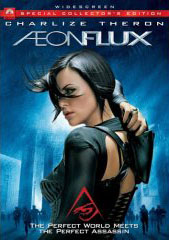
 There's something about an adaptation of anything into another format that immediately lends itself to more scrutiny than it would naturally receive. This is certainly because of the fact that comparisons will be made between the adaptation and the original, be it a book, comic, TV series, etc. In the case of Aeon Flux, there was the "Aeon Flux" cartoon series to contend with, which, for what it was, was very intelligent and well-made, a dystopian future where a "1984"-like war existed eternally, neighboring states keeping up a continuous fight. This movie, of course, greatly diminishes that concept.
There's something about an adaptation of anything into another format that immediately lends itself to more scrutiny than it would naturally receive. This is certainly because of the fact that comparisons will be made between the adaptation and the original, be it a book, comic, TV series, etc. In the case of Aeon Flux, there was the "Aeon Flux" cartoon series to contend with, which, for what it was, was very intelligent and well-made, a dystopian future where a "1984"-like war existed eternally, neighboring states keeping up a continuous fight. This movie, of course, greatly diminishes that concept.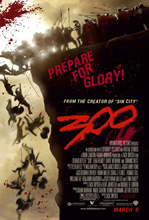
 The very concept of 300 was exciting: a heavily-stylized and violent period action based on the visual look and story of Frank Miller's graphic novel. Maybe a little too exciting, as this movie became one of the most over-hyped films in recent memory.
The very concept of 300 was exciting: a heavily-stylized and violent period action based on the visual look and story of Frank Miller's graphic novel. Maybe a little too exciting, as this movie became one of the most over-hyped films in recent memory.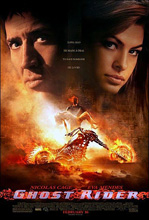
 I finally gave in and saw Ghost Rider, facilitated by 300 being sold out. I had intended to catch it, at least for laughs, but had never gotten around to it, lacking the time to go out and see it.
I finally gave in and saw Ghost Rider, facilitated by 300 being sold out. I had intended to catch it, at least for laughs, but had never gotten around to it, lacking the time to go out and see it.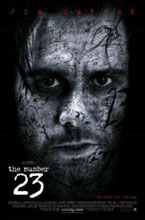
 Not one of the best but one of the most interesting films to come out this year, The Number 23 is a return to dark subject matter for both Jim Carrey and Joel Schumacher.
Not one of the best but one of the most interesting films to come out this year, The Number 23 is a return to dark subject matter for both Jim Carrey and Joel Schumacher.